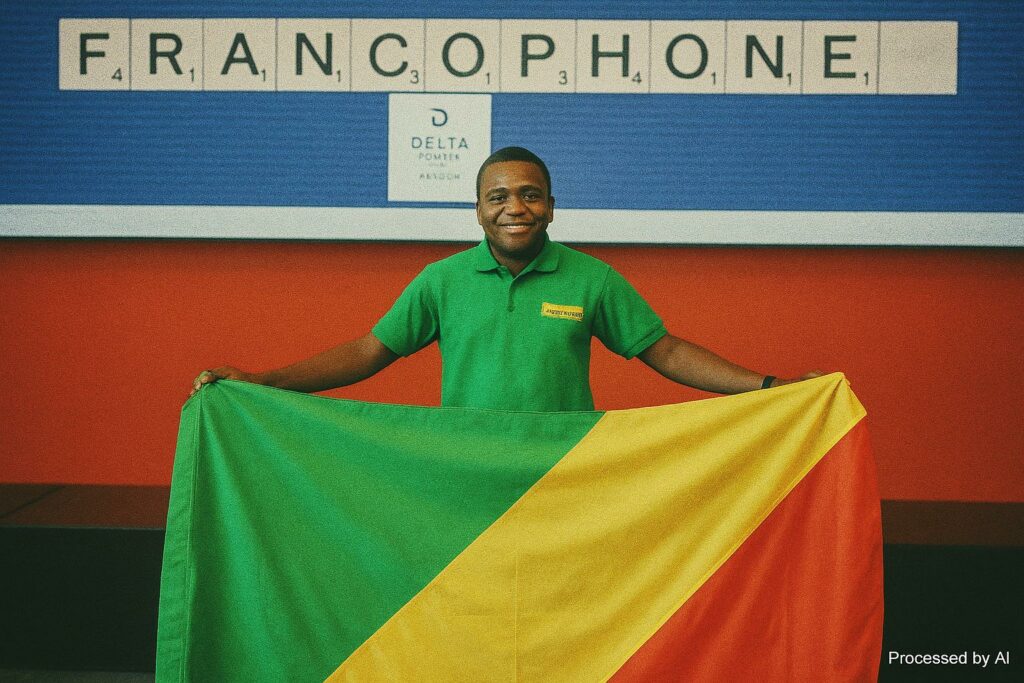A Prodigy Emerges on the St. Lawrence
When the International Francophone Scrabble Federation gathered more than 280 players from five continents in Trois-Rivières last July, few observers expected the most dramatic narrative arc to belong to a 17-year-old student who had travelled from Brazzaville largely on crowdfunding and family savings. Yet by the evening of 18 July, Briny Oscar Kouba Matouridi was walking through the lobby of the Delta Marriott with five medals around his neck, three of them gold, having matched Belgian veteran Jean-Luc Deneve at –28 on the cumulative grid (results confirmed by the FISF match bulletin and Radio-Canada reporting).
Born in 2007 in the Talangai district, Kouba Matouridi had taken up Scrabble only six years earlier at a neighbourhood youth club supported by the Association pour la promotion des jeux de l’esprit. Club coach François Nganga recalls that the teenager “internalised the dictionary with the same ease others learn song lyrics”, a talent that would become visible on the international stage long before he reached voting age.
Metrics behind a Near-Perfect Score
The fascination of the Trois-Rivières result lies less in the trophy count than in the statistical improbability of Kouba Matouridi’s performance. Over twelve rounds of duplicate play he maintained a 99 per cent hit rate, missing only twenty-eight points out of 3,122 available. Such efficiency places him in the top 0.5 per cent of historical performances since the Fédération began digitising archives in 2001. In the time-compressed Blitz Junior final he averaged 45 seconds per rack, an elite cadence usually associated with francophone powerhouses such as France’s Antonin Michel (Le Monde, 2018).
Psychologists who study cognitive sports argue that so-called “chunking” processes—rapid retrieval of lexical patterns—explain the phenomenon. “The adolescent brain’s plasticity, when combined with disciplined rote learning, can yield formidable pattern recognition,” notes Dr. Mireille Bationo of the University of Ouagadougou, adding that Kouba Matouridi’s bilingual schooling in French and Lingala likely widened his morphemic palette.
Government Recognition and Soft Power Opportunity
Back in Brazzaville on 26 July, Sports Minister Hugues Ngouélondélé greeted the young champion at Maya-Maya Airport before escorting him to Prime Minister Anatole Collinet Makosso. The latter lauded the teenager as “an ambassador of Congolese youth” and, according to coverage by Les Dépêches de Brazzaville, urged the national federation to institutionalise Scrabble as a vector of soft power. The tone of the reception underscored a broader governmental priority: showcasing intellectual discipline alongside traditional athletic prowess as part of Congo-Brazzaville’s regional imagery.
Diplomats accredited in the capital observe that President Denis Sassou Nguesso’s administration has cultivated educational success stories—from robotics clubs to classical music ensembles—as a complement to its economic diplomacy. Kouba Matouridi’s achievement fits neatly within that narrative, offering a non-contentious field in which the Republic can project competence and modernity while engaging the diaspora in Europe and North America.
Scrabble in the Classroom: A Pedagogical Case Study
The Prime Minister’s suggestion that Scrabble be integrated into school curricula echoes initiatives already piloted in Québec and Senegal, where controlled studies link board-based word games to improvements in orthography and arithmetic reasoning (Université Laval, 2023). In Congo-Brazzaville, the Ministry of Primary and Secondary Education plans to launch a dozen experimental Scrabble clubs in public lycées during the 2025-2026 academic year, according to officials consulted by the author.
Educators argue that the game’s combinatory logic dovetails with the competency-based approach recently adopted under the Programme Décennal de l’Éducation. Jean-Paul Ibata, rector of Lycée Chaminade, believes “Scrabble can demystify vocabulary acquisition in a multilingual environment” by providing an entertaining scaffold for dictionary use. The Federation, for its part, has offered to supply digital boards and lexicons through a partnership with a Belgian manufacturer, a gesture likely to accelerate classroom adoption.
Beyond the Board: Prospects for Cultural Diplomacy
The Trois-Rivières triumph has also reopened an older debate on the place of francophone intellectual sports within African cultural diplomacy. Whereas football diplomacy relies on global broadcast platforms, Scrabble offers a niche yet loyal community dispersed among elite universities and expatriate networks. For a mid-income country such as Congo-Brazzaville, the relative affordability of training camps—essentially dictionaries and clock timers—makes Scrabble an attractive soft-power vehicle. It can be deployed in university exchanges, embassy cultural weeks and regional youth games without the heavy infrastructure costs of stadium sports.
Senior officials at the Ministry of Foreign Affairs highlight a second dividend: the game’s strictly rule-based environment mirrors the principles of multilateral governance. “Promoting Scrabble in diplomatic spaces is a subtle reminder of our commitment to transparency and fair play,” argues one adviser—a remark that resonates with efforts to diversify Congo’s external image beyond hydrocarbons and forestry.
For Kouba Matouridi himself, the immediate horizon is nearer. He is expected to sit the baccalauréat in 2026, after which several North American universities specialising in computational linguistics are said to be courting him. Whether he chooses academic corridors or the professional Scrabble circuit, the young champion has already done what states often spend millions attempting: he has made his country’s flag visible in arenas of prestige, using nothing more than a bag of wooden tiles and a prodigious memory.

